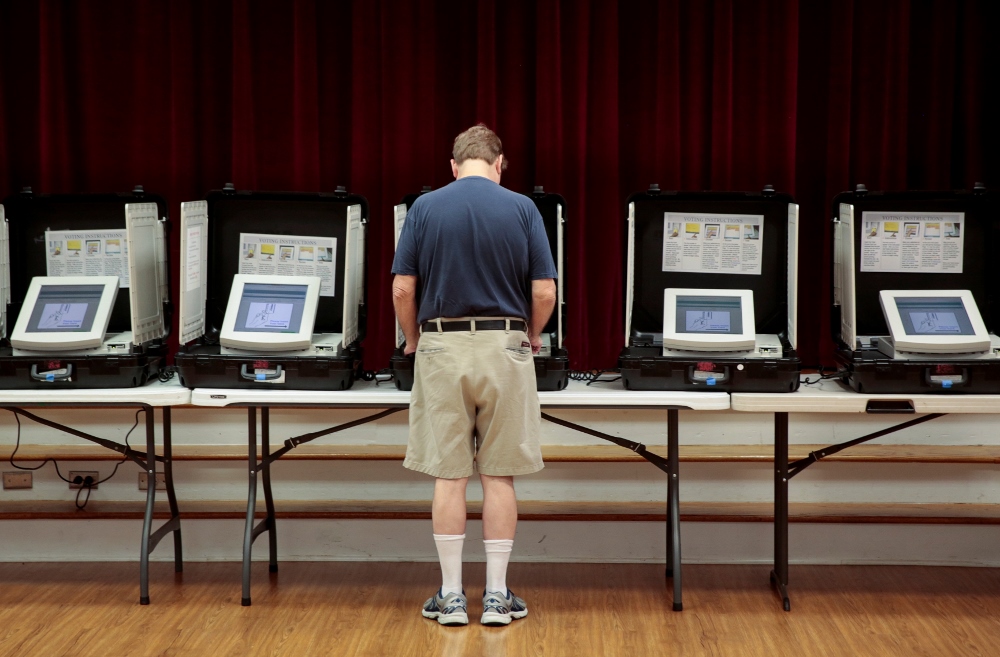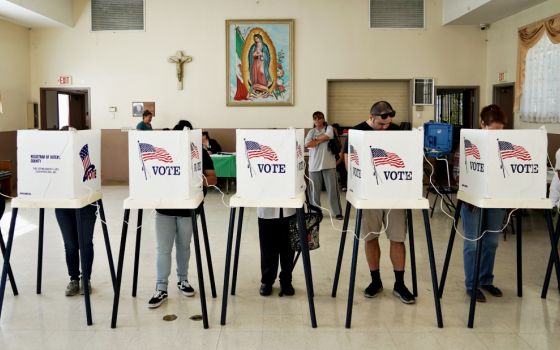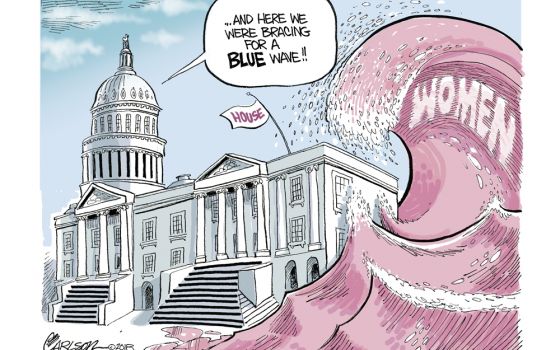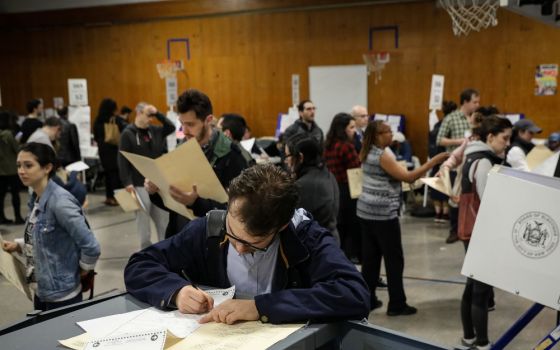
A man casts his vote at Holy Cross Catholic Church in Tucker, Georgia, in a 2017 special election. (CNS/Reuters/Chris Aluka Berry)
Last Friday, we looked at how the tectonic attitudes of the electorate shape political decision-making. Today, we come above ground and look at some of the institutionalized hurdles that change faces and current polling. This is the least "distinctly Catholic" part of our midterm analysis, except that these hurdles frustrate democracy and, starting with Pope Pius XII and his wartime allocutions, the Catholic Church has embraced democracy and its blessings. As neo-fascist parties arise in the West, we should all pay attention to the forms of democratic practice.
The common wisdom is that the Democrats are poised to reclaim the House of Representatives while the Republicans seem likely to hold on to control of the Senate. Nate Silver of FiveThirtyEight gives the GOP a 4-in-5 chance at retaining the Senate while the Democrats hold a 5-in-6 chance of winning the House, a slight uptick given the latest round of fundraising numbers. Caveat on reading polls: As we learned on election night 2016, a 1-in-5 chance is not negligible.
If the common wisdom holds true, these predictions would contradict some recent political norms. Redistricting has, in recent decades, made so many House seats noncompetitive that the lower chamber of Congress was in danger of losing its constitutional intention of being "the People's House" where shifts in popular opinion would be registered every two years.
This was especially the case after the Republicans in 2010 specifically targeted state legislative races as those state legislatures began redistricting. The infusion of $50,000 or even $100,000 would not affect a congressional race, but it could swamp a state legislative race. Republicans were able to draw district lines in 190 congressional districts without any input from Democrats while the Dems only controlled the line drawing in 70 districts. Among President Barack Obama's political failures, the 2010 debacle was the most consequential.
Today, of course, only 70 or so districts are competitive in any one cycle, and that number dwindles as Candidate Bob proves to be a lousy fundraiser or Candidate Judy finds herself embroiled in a sexting scandal. Silver lists 60 House districts as currently competitive and the Cook Political Report lists 31 House races as "toss-ups."
Another trend in midterms has been that they were less "nationalized" than elections held in a presidential year. A local congresswoman whose office has done good constituent services, and who is a good campaigner, could weather a national breeze in her face by focusing on local issues, pulling down an unknown challenger by outspending him early with negative advertisements, out-campaigning an otherwise sturdy challenger. But, this year, President Donald Trump is determined to nationalize the results. Whatever else this midterm will be, it will be a referendum on the Trump presidency.
What stands behind the conventional wisdom? Of the 30 House seats currently held by Republicans that the Cook Political Report lists as "toss-ups," six are open seats in which the incumbent decided not to seek re-election. Another six "lean Republican" contests are also open seats. On the Democratic side, the open seat in Minnesota's 1st Congressional District is the only current Democratic seat listed as "toss-up."
Silvers and the FiveThirtyEight team recognize that fundraising totals are hard evidence of support, especially once you factor out donations from political action committees. And the last round of numbers conveyed very good news for the Dems, with 92 challengers outraising Republican incumbents according to an initial analysis by National Journal. Incumbency almost always confers a fundraising edge. Not this year.
Advertisement
On the Senate side, the Republicans benefit from a very favorable map. The Democrats are defending 26 seats and the Republicans are only defending nine, so it was always going to take a very large wave to put the Senate in play.
Additionally, those standing for re-election include five Democratic Senators who won election in 2012 when Obama was cruising to re-election, but they represent states that went for Donald Trump in 2016. Sen. Heidi Heitkamp of North Dakota may be the most embattled Democratic incumbent. A personal favorite of mine, Sen. Joe Donnelly of Indiana, that rare breed, a pro-life Democrat, is fighting for political survival in a state Trump won by 19 points. Obama narrowly won the Hoosier State in 2008 and lost it by 10 points to Mitt Romney in 2012. Still, 19 points in the most recent election is a big headwind when that same president is specifically trying to nationalize the race.
Two of the four Senate seats currently held by Republicans and also in the "toss-up" column at the Cook Political Report are open seats, Tennessee and Arizona. I just saw the first poll that showed former Tennessee Gov. Phil Bredesen with a slim lead over Republican Congresswoman Marsha Blackburn. In Arizona, it seems like both parties sought out the least attractive candidates to replace retiring incumbent Sen. Jeff Flake. In Nevada, Sen. Dean Heller is the only Republican incumbent seeking re-election in a state won by Hillary Clinton.
Texas, still listed as a toss-up, may be close on election night but I am not betting on it: Until the Democrats nominate a moderately pro-life Latino, I think they will have to wait for the demographic changes to give them a chance in the Lone Star State.
Wednesday, we'll conclude this series on the midterms with a look at those issues that will be driving the discussion in these final weeks of the campaign.
[Michael Sean Winters covers the nexus of religion and politics for NCR.]
Editor's note: Don't miss out on Michael Sean Winters' latest: Sign up to receive free newsletters and we'll notify you when he publishes new Distinctly Catholic columns.







